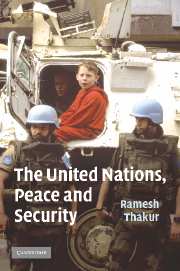Book contents
- Frontmatter
- Contents
- List of figures
- List of tables
- Foreword, Gareth Evans
- Acknowledgements
- Introduction
- PART I An international organisation for keeping the peace
- PART II Soft security perspectives
- PART III Hard security issues
- 7 The nuclear threat
- 8 International terrorism
- 9 Kosovo 1999
- 10 Iraq's challenge to world order
- 11 The responsibility to protect
- 12 Developing countries and the eroding non-intervention norm
- PART IV Institutional developments
- Conclusion: at the crossroads of ideals and reality
- Index
11 - The responsibility to protect
Published online by Cambridge University Press: 24 May 2010
- Frontmatter
- Contents
- List of figures
- List of tables
- Foreword, Gareth Evans
- Acknowledgements
- Introduction
- PART I An international organisation for keeping the peace
- PART II Soft security perspectives
- PART III Hard security issues
- 7 The nuclear threat
- 8 International terrorism
- 9 Kosovo 1999
- 10 Iraq's challenge to world order
- 11 The responsibility to protect
- 12 Developing countries and the eroding non-intervention norm
- PART IV Institutional developments
- Conclusion: at the crossroads of ideals and reality
- Index
Summary
The worst act of domestic criminal behaviour by a government is large-scale killings of its own people; among the worst acts of international criminal behaviour, to attack and invade another country. The history of the twentieth century is in part the story of a twin-track approach to tame, through a series of normative, legislative and institutional fetters, both these impulses to armed criminality by states. Cumulatively and in combination, these attempted to translate an increasingly internationalised human conscience and a growing sense of an international community into a new normative architecture of world order. There is growing recognition of the authority of international consensus over individual state consent as the foundation of legal obligation. The notion of ‘excess state violence’ has evolved to challenge the use of violence by any state in its internal and international behaviour beyond the level that international political actors consider to be legitimate.
Saddam Hussein's record of brutality was a taunting reminder of the distance yet to be traversed before we reach the first goal of eradicating domestic state criminality; his ouster and capture by unilateral force of arms is a daunting challenge to the effort to outlaw and criminalise war as an instrument of state policy in international affairs. But what if the second failure is a response to the first, if one country is attacked and invaded in order to halt or prevent atrocities inside its sovereign territory by the ‘legitimate’ government (which already indicates a troubling appropriation and corruption of the word ‘legitimate’)?
- Type
- Chapter
- Information
- The United Nations, Peace and SecurityFrom Collective Security to the Responsibility to Protect, pp. 244 - 263Publisher: Cambridge University PressPrint publication year: 2006
- 1
- Cited by



